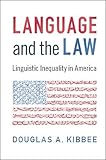Language and the law : linguistic inequality in America / Douglas A. Kibbee.
Material type: TextPublication details: United Kingdom Cambridge University Press 2016Description: 231 pISBN:
TextPublication details: United Kingdom Cambridge University Press 2016Description: 231 pISBN: - 9781107623118 (paperback)
- 9781107025318 (hardback)
- 342.73087 KIB-D
- KF3466 .K53 2016
| Item type | Current library | Collection | Shelving location | Call number | Status | Date due | Barcode | Item holds |
|---|---|---|---|---|---|---|---|---|
 Books
Books
|
BITS Pilani Hyderabad | 340 | General Stack (For lending) | 342.73087 KIB-D (Browse shelf(Opens below)) | Available | 32653 |
Includes bibliographical references (pages 200-217) and indexes.
Equality, liberty, and fairness in America -- Language and democracy -- Linguistic inequality in the legal system -- Language and education -- Government, public services, and the English-only movement -- Language in the workplace -- Conclusions
"All men are created equal" is the first "self-evident truth" of the Declaration of Independence. However clearly they are equal only in their fundamental humanity, not in their physical attributes or mental talents. These natural differences create distinctions both rational and irrational. The law is called upon to regulate these distinctions, to ensure rationality while preserving liberty through the institutions of a democratic state . Is distinction based on language natural and rational, or arbitrary and irrational? In the following pages we will examine the determination of legal and illegal distinctions, in national and international frameworks"--



There are no comments on this title.